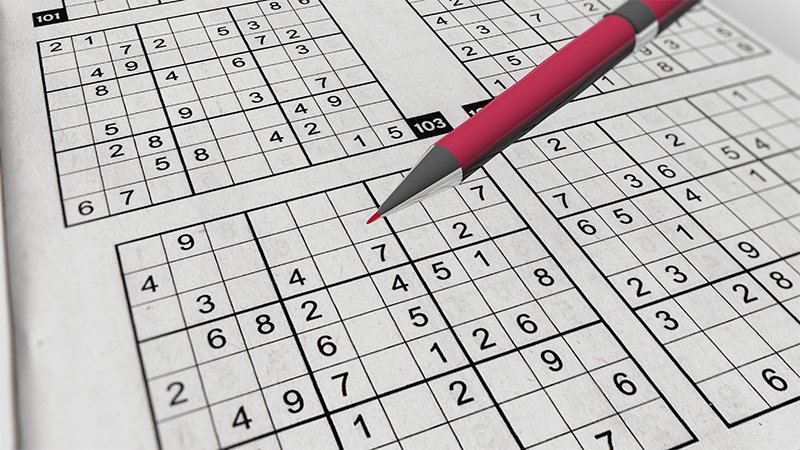Everyday Brain Games to Keep Your Mind Sharp
We’ve all had moments where we feel like our brain isn’t running at full speed. Maybe you’ve misplaced your keys, or can’t recall a name during a conversation. Perfectly healthy people can experience memory lapses at any age, including memory loss or memory distortion. Brain games are neurological exercises designed to help exercise your brain and keep your mind sharp for the long haul.
What is Neuroplasticity?
In its most basic definition, neuroplasticity is the brain’s ability to mold and change over time. As our brain continues to develop, old neural pathways are replaced with new efficient pathways. You are never too old to challenge and shape your brain! Regardless of your age, complex and new activities are great brain games. Benefits to challenging your neurons with brain games include improved memory, focus, mood, and much more.
When it comes to participating in brain games and brain exercises, you don’t have to spend money on apps or neurological programs. In fact, some of the best brain games and challenges can be completed during your everyday routine.
Get Physical with Brain Games
Aerobic exercise makes the heart beat faster, which improves blood flow to the brain. This blood delivers oxygen, which it needs, as the brain is the largest consumer of oxygen in the body. According to the National Center for Biotechnology Information (NCBI), physical activity also increases levels of Brain-Derived Neurotropic Factor (BDNF), which is known to help protect and repair brain cells from degeneration. Additionally, exercise promotes the growth of new brain cells and neurons.
Dr. Bradford Dickerson, associate professor of neurology at Harvard Medical School, sites that the best correlation between exercise and brain health is exhibited through daily aerobic exercise. Several studies and clinical trials have linked regular aerobic exercise to a reduced risk of dementia.
When you are exercising, keep it interesting. Try multiplying numbers in your head. As you kick off that trail run or functional fitness workout, recite the alphabet backwards. Playing brain games while you exercise is great for brain health. Additionally, several brain imaging studies have shown aerobic exercise increases brain mass and improves reasoning ability. So hit the treadmill, go for a walk in the park, or play tag with your children – just keep moving! The best exercise “dose” is 30 minutes or more per day, five times a week.
Switch Hands
Switching hands is a great brain exercise. If you are right handed, try using your non-dominant left hand for all of your daily activities. Switch hands when you eat your food, brush your teeth, write, and even when you use your computer mouse. Using your non-dominant hand increases brain activity and adds a little challenge to your everyday routine.
Complete Tasks Backwards or Upside Down
Viewing thing backwards or upside down is very stimulating for your brain. Start simple by flipping your clock upside down. This simple action forces your brain to work every time you look at the clock for the time.
If you’re really adventurous, you can connect with your inner Leonardo da Vinci and master mirror writing (the ability to write backwards). Challenging and fun, completing tasks upside down or backwards is very exciting for your brain.
Read Aloud
 Reading aloud is an excellent brain game to complete with your children and family. According to NCBI, one of the earliest demonstrations of brain imaging clearly showed three distinct regions of the brain light up when the same word was heard, read, and spoken.
Reading aloud is an excellent brain game to complete with your children and family. According to NCBI, one of the earliest demonstrations of brain imaging clearly showed three distinct regions of the brain light up when the same word was heard, read, and spoken.
Reading aloud works your imagination in a different manner. So pick up your favorite book, and take turns reading aloud.
Skip the Navigation
Remember the old-fashioned days when we had to rely on maps and use our brains to get where we needed to go? With today’s ever-evolving technologies, most of us rely on navigation apps to drive everywhere; even to and from work!
When we use our navigation systems during routine commutes, we are essentially placing our brain on autopilot. Using navigation generates very little brain stimulation. Consider turning off the phone and using your brain to navigate. Consider taking an alternate route. This will activate the cortex and hippocampus, which are responsible for the consolidation of information from short-term memory to long-term memory. The cortex and hippocampus also contribute to spatial memory, which facilitates navigation.
Although many of these brain games and exercises may seem easy, they’ll work wonders for boosting your cognitive function. Start with the basics, and you will be amazed at the results!
You may also like:
7 Healthy Habits for Greater Physical & Mental Well‑Being
Chronic Pain on the Brain: 4 Psychological Effects of Living With Pain
